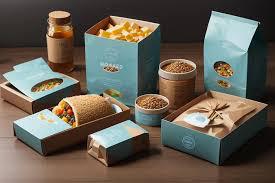Wholesale food packaging plays a critical role in the food supply chain, ensuring that products are transported safely, stay fresh, and meet regulatory requirements. As the food industry continues to evolve with growing consumer demands for convenience, sustainability, and safety, innovations in wholesale food packaging are shaping how food is packaged, preserved, and presented.
In this article, we’ll explore the importance of wholesale food packaging, current trends, and how sustainability is driving innovation in the sector.

The Role of Wholesale Food Packaging
Food packaging is far more than a protective layer; it’s a key component in ensuring the quality, safety, and appeal of products. For wholesale businesses, the stakes are even higher, as they often deal in large quantities of food that require proper handling over long distances and extended periods.
Some of the main functions of wholesale food packaging include:
- Preservation: Packaging helps to extend the shelf life of perishable items, maintaining freshness and preventing spoilage.
- Protection: It shields food products from contamination, physical damage, and environmental factors like moisture, light, and temperature fluctuations.
- Compliance: Packaging must meet strict regulations related to food safety and labeling, ensuring transparency and consumer protection.
- Convenience: In the wholesale sector, packaging needs to be easy to store, transport, and manage, providing efficiency to both suppliers and retailers.
Trends in Wholesale Food Packaging
The wholesale food packaging industry is undergoing rapid changes, driven by technological advancements, shifting consumer preferences, and regulatory pressures. Here are some of the most significant trends shaping the landscape:
- Sustainable Packaging Solutions
With growing awareness around environmental issues, both consumers and businesses are pushing for more sustainable packaging options. This includes the use of biodegradable, recyclable, and compostable materials that reduce waste and lower the carbon footprint. Wholesale suppliers are increasingly turning to materials such as:
- Plant-based plastics (PLA)
- Paper-based packaging
- Recyclable plastics and aluminum
- These eco-friendly alternatives are designed to meet consumer demand for sustainability without sacrificing functionality or durability.
- Smart Packaging
Smart packaging incorporates technologies that improve the safety, freshness, and traceability of food products. Some innovations include:
- RFID (Radio Frequency Identification): For tracking and managing inventory in real-time, helping wholesalers monitor food during transit.
- Temperature-sensitive labels: These labels change color based on the temperature of the food, ensuring it stays within safe limits.
- QR codes: Used to provide consumers with detailed product information, from sourcing and nutritional data to best-by dates, enhancing transparency.
- Flexible Packaging
Flexible packaging, such as pouches, bags, and films, is becoming increasingly popular in the wholesale food sector. These materials are lightweight, cost-effective, and offer excellent product protection. Additionally, flexible packaging is easy to store and takes up less space than traditional rigid packaging, making it ideal for large-scale food distribution.
- Minimalist and Transparent Packaging
Consumers today value simplicity and transparency in packaging. Minimalist designs, featuring clean lines and clear labeling, give products a more premium feel while ensuring that customers can quickly identify ingredients and expiration dates. Clear packaging also allows customers to see the product inside, which builds trust and enhances product appeal.
- Portion-Controlled Packaging
With the rise of bulk purchasing and an increased focus on reducing food waste, portion-controlled packaging is gaining traction in wholesale food distribution. This packaging format allows retailers and foodservice providers to access pre-measured quantities of products, minimizing waste and streamlining inventory management.
Sustainability: A Key Driver of Innovation
Sustainability is no longer just a buzzword in the food packaging industry—it’s a fundamental expectation. The environmental impact of packaging is a significant concern for consumers, regulators, and businesses alike. Wholesale food packaging companies are under pressure to balance functionality with environmental responsibility.
Key strategies for enhancing sustainability in food packaging include:
- Source reduction: Using fewer materials to achieve the same level of protection and quality.
- Recyclable and biodegradable materials: Transitioning to materials that are easier to recycle or that break down naturally in the environment.
- Circular economy models: Encouraging a closed-loop system where packaging materials are reused, recycled, or composted, reducing waste in landfills.
For instance, major companies are now exploring plant-based plastics and other bio-materials to replace traditional petroleum-based plastics, which contribute significantly to environmental pollution. The use of these alternatives not only satisfies consumer demand for eco-friendly packaging but also positions businesses as leaders in the sustainability movement.
Conclusion
Wholesale food packaging plays a pivotal role in the food supply chain, balancing product protection, freshness, and compliance with evolving market demands. As the industry moves towards more sustainable and innovative packaging solutions, companies must stay ahead of the curve by adopting eco-friendly practices and leveraging new technologies. By prioritizing sustainability and embracing cutting-edge packaging designs, businesses can meet the challenges of a rapidly evolving market while enhancing their brand reputation and operational efficiency.
The future of wholesale food packaging lies in striking the right balance between functionality and environmental stewardship—ensuring that businesses not only deliver quality products but also contribute to a greener and more responsible global food system.